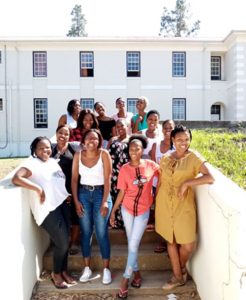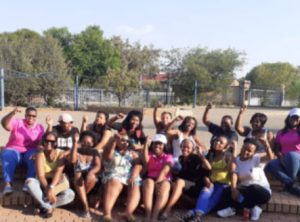Mercilene Machisa, Pinky Mahlangu and Yandisa Sikweyiya
 ‘’Yes, these things do happen in our lives, we get raped by people, even those that we date, or someone forces you to do something that you do not want to do’’. Female student at SA campus
‘’Yes, these things do happen in our lives, we get raped by people, even those that we date, or someone forces you to do something that you do not want to do’’. Female student at SA campus
Population-based surveys have found high prevalence of sexual violence against women in South Africa (1, 2), and female students enrolled in higher education are not exempt. However, there is a lack of rigorously tested and evaluated campus-based sexual violence interventions in the country (3).
Prevalence and risk factors for sexual violence experience
In a survey completed by a volunteer sample of female students from nine campuses in South Africa, 20% experienced sexual violence in the past year (4). Female students’ sexual violence risk was associated with poorer family background, experiencing food shortage and other material pressures faced in adapting to campus life. Female students who experienced sexual violence were more likely to have experienced adverse childhood, other traumas, abusive male partners, and to report depressive and post-traumatic stress symptoms(4). Sexual violence experience occurred in contexts of students’ regular heavy drinking as part of entertainment and engaging in transactional sex.
Developing Ntombi Vimbela!
Informed by formative research findings and effective evidence based interventions (EBIs) including Stepping Stones Creating Futures (5), the Enhanced Assess, Acknowledge, Act Sexual Assault Resistance program (EAAA) (6) and SASA! Raising Voices (7), our research team at the Gender and Health Research Unit of the South African Medical Research Council developed Ntombi Vimbela! to fill the critical gap of sexual violence interventions in South African higher education settings. Ntombi Vimbela! is a risk reduction intervention which consist of a series of ten peer facilitated workshop sessions each running for 3.5 hours and targeting first-year female students. Activities are designed for participatory learning about sexual rights, assertive communication, gender (in)equality, healthy sexual relationships, violence against women and its drivers, identifying sexual assault risk and sexual assault resistance strategies. Ntombi Vimbela! content equips participants with coping skills to withstand social or material pressures or other mental stressors whilst adapting to campus life. Ntombi Vimbela! also promotes the use of health, psycho-social services and access to justice. Acknowledging that some participants could be sexual violence survivors, workshops focus on building empathy, appropriating blame towards the perpetrator and minimizing survivor self-blame.
Female student at SA campus[/mk_blockquote]
 Piloting Ntombi Vimbela!
Piloting Ntombi Vimbela!
We conducted a pilot of Ntombi Vimbela! from July to October 2019. We recruited, trained and supported peer facilitators to conduct workshop sessions in eight selected campuses with 118 volunteering first-year female students. Workshops were held outside of the schooling hours as agreed with participants. The facilitator teams fostered rapport, espoused the values of respect, confidentiality and sisterhood which created safe spaces for participants to engage and learn as illustrated below.
Female student at SA campus
[/mk_blockquote][mk_blockquote font_family=”none”]“If you maybe share a story and then the next session when you come to attend they don’t look at you and judge you because of what you shared, they are always fine as if nothing happened and that is what gave me the power because they did not judge me or look at me as if they have questions they are all right and I feel free around them.”
Female student at SA campus[/mk_blockquote]
Ntombi Vimbela! is relevant for South African higher education settings
The pilot focused on determining whether Ntombi Vimbela! content was acceptable and relevant to first-year female students and whether its manualised delivery methods were feasible. After facilitators completed conducting workshops in the different sites, the research team held group discussions to obtain participant feedback. Participants found Ntombi Vimbela! to be relevant for first-year female students because it resonated with their lived experiences. They recommended that the benefits of Ntombi Vimbela would be maximized if it was implemented at the beginning of the academic year, a time at which first-year female students are most vulnerable.
Female student at SA campus[/mk_blockquote]

Ntombi Vimbela! holds promise for empowerment, gender transformation and sexual assault risk reduction
Participants shared positive personal changes including better understanding of sexual rights, improved bodily autonomy, self-esteem, self-confidence, enhanced communication skills and emotional expressiveness. Their gender beliefs began to shift, and they challenged inequitable dynamics within their intimate relationships.
Female student at SA campus[/mk_blockquote]
Ntombi Vimbela! equips participants to identify sexual assault risk and implement protective strategies including assertive communication, verbal resistance and physical self-defence. The pilot participants found the content of Ntombi Vimbela! useful and were confident to use the skills gained to minimise sexual assault risk.
Female student at SA campus[/mk_blockquote]
Participants appreciated WenDo, the feminist self-defense group training they received. Participants were confident that the skills they gained would be helpful in sexual assault risky situations. However, given the timing of the feedback, participants had limited exposure from which to share their use of the skills in real situations.
Female student at SA campus[/mk_blockquote]
Way forward- testing Ntombi Vimbela!’s effectiveness
While we have received positive feedback indicating Ntombi Vimbela!’s promise, we need to conduct a pragmatic randomised control trial which will establish its effectiveness in reducing female students’ sexual assault over time. Conducting a cost-effectiveness study will also help policymakers to make decisions regarding the scaling-up of Ntombi Vimbela! in South African institutions.
* Authors: Mercilene Machisa, Pinky Mahlangu and Yandisa Sikweyiya are Specialist Scientists at the SAMRC Gender and Health Research Unit and Honorary Lecturers at the University of Witwatersrand’s School of Public Health
* Acknowledgements: This project was made possible through the funds received from the South African Medical Research Council’s Social Impact Bond and the Sexual Violence Research Initiative. We gratefully acknowledge the University of California Global Health Institute (UCGHI) Center of Expertise on Women’s Health, Gender and Empowerment, for its strong support for the financial elements of this grant.
References
- Machisa M, Jewkes R, Morna C, Rama K. The war at home: Gender based violence indicators project. Gender Links and the South African Medical Research Council, Johannesburg, South Africa. 2011.
- Jewkes R, Penn-Kekana L, Levin J, Ratsaka M, Schrieber M. Prevalence of emotional, physical and sexual abuse of women in three South African provinces. South African medical journal. 2001;91(5):421-8.
- South African Department of Higher Education and Training n. Policy Framework to address Gender-Based Violence in the Post-School Education and Training System version 4 for Public Comment. In: Training DoHEa, editor. Pretoria2019.
- Machisa M, Chirwa, E., Mahlangu, P., Sikweyiya, Y., Nunze, N., Dartnall, E., Pillay, M., Jewkes R. Factors associated with female students’ experience of sexual violence in South African public higher education settings: a cross-sectional study. In press. 2020.
- Gibbs A, Washington L, Abdelatif N, Chirwa E, Willan S, Shai N, et al. Stepping Stones and Creating Futures intervention to prevent intimate partner violence among young people: cluster randomized controlled trial. Journal of Adolescent Health. 2020;66(3):323-35.
- Senn CY, Eliasziw M, Barata PC, Thurston WE, Newby-Clark IR, Radtke HL, et al. Efficacy of a sexual assault resistance program for university women. New England journal of medicine. 2015;372(24):2326-35.
- Abramsky T, Devries KM, Michau L, Nakuti J, Musuya T, Kyegombe N, et al. The impact of SASA!, a community mobilisation intervention, on women’s experiences of intimate partner violence: secondary findings from a cluster randomised trial in Kampala, Uganda. J Epidemiol Community Health. 2016:jech-2015-206665.


Hi, this is a comment.
To get started with moderating, editing, and deleting comments, please visit the Comments screen in the dashboard.
Commenter avatars come from Gravatar.